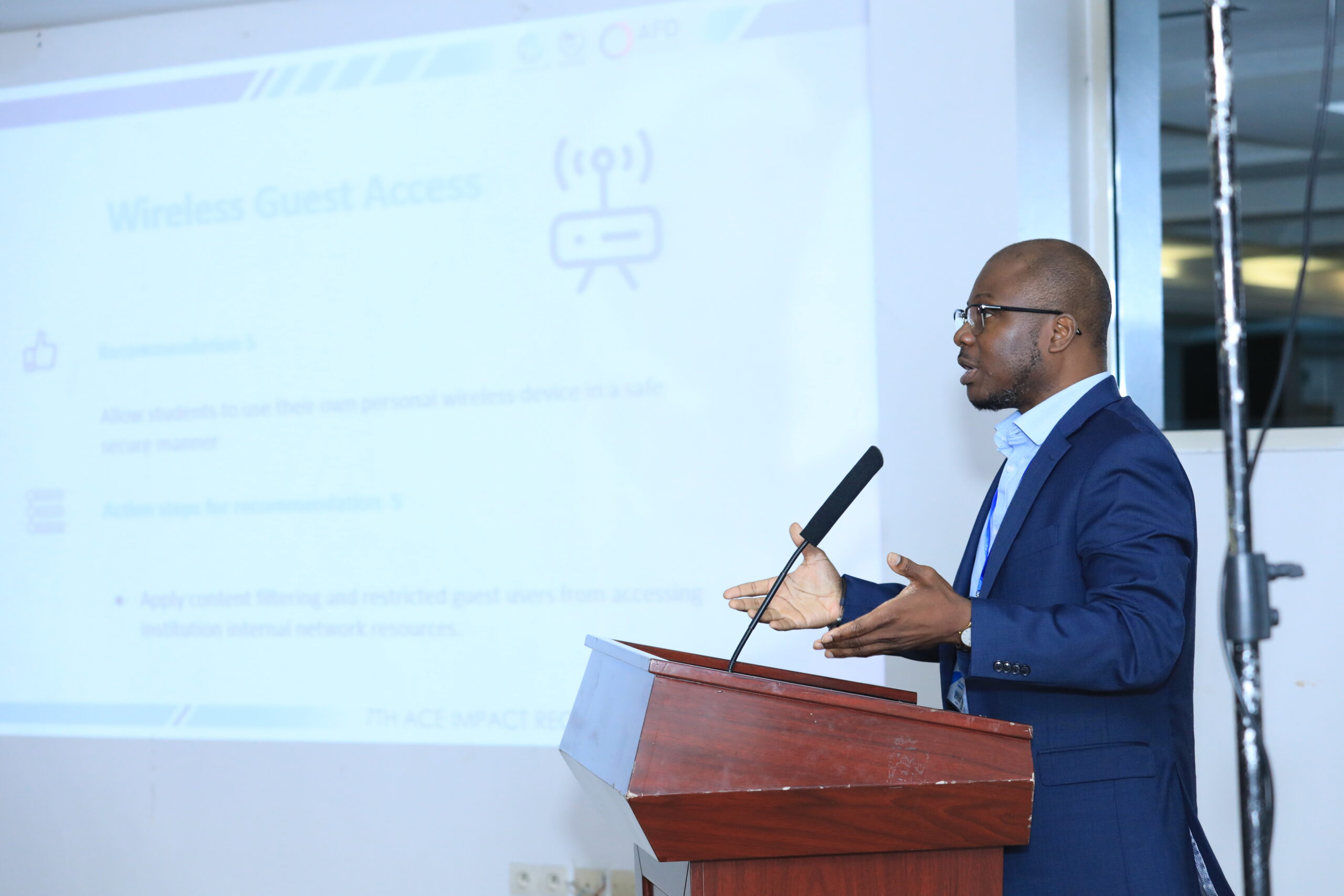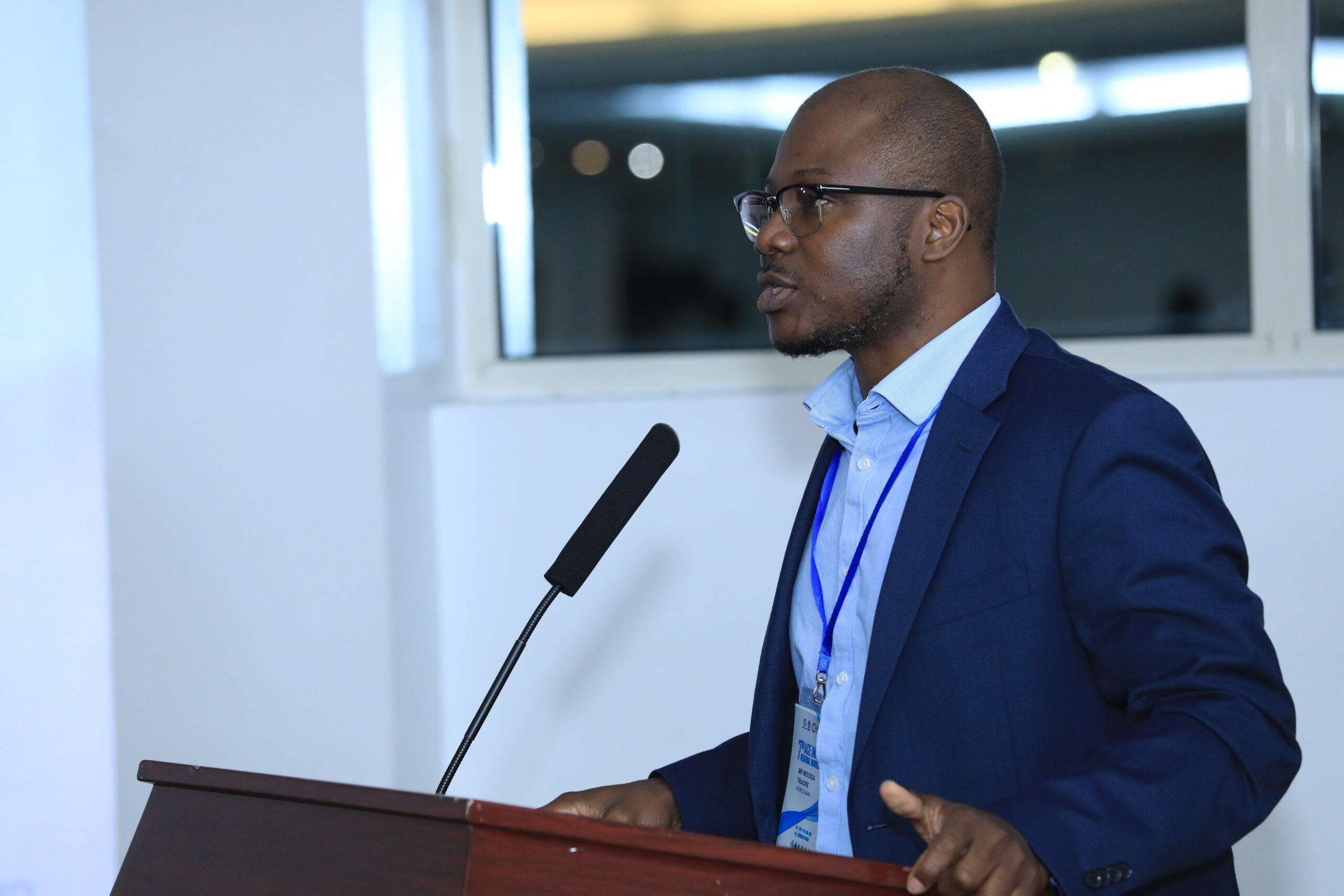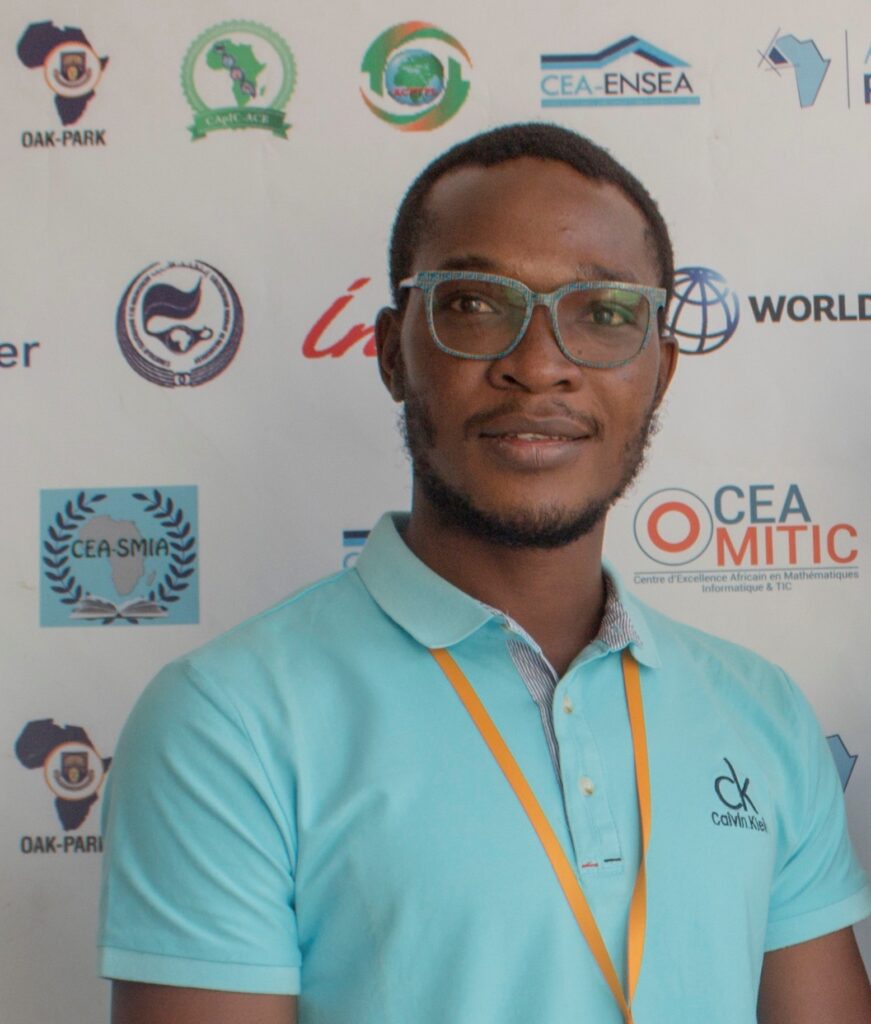“Place Students and Faculty at the Center of Digital Infrastructure Implementation” – a Senior Digital Education Expert Advises
Mr. Moussa Traore an International Digital Education Expert from the World Bank advised African Universities to always prioritize the needs of students and faculty when designing and implementing digital infrastructure. This is important because technological infrastructure must be used by students and faculty to achieve the intended learning outcomes and produce skilled graduates that would be able to address Africa’s developmental challenges. African Universities tend to prioritize internet access for their administrative purposes and not for teaching, learning and research needs, stated Mr. Traore. He said this while making a presentation during the digital transformation session at the 7th ACE Impact Regional Workshop hosted in Benin from 14-17 June 2022.
The overall “ICT for digital and remote learning” recommendations shared by Mr. Traore focused on infrastructure and equipment; technical support and training; quality digital content and resources and digital education policies and data governance.
Infrastructure and equipment
Mr. Traore advised universities to gradually migrate their applications, platforms, and related infrastructure to the cloud because this would reduce the need to invest in internal skills for maintaining the infrastructure. Cloud hosting also ensures that the digital platforms are continuously accessible and not affected by power outages.
Universities were encouraged to develop long-term plans for their infrastructure, which must include the replacement of wired and wireless cabling, devices and identifying funding sources. It was also said that university digital transformation plans must indicate how the security and protection of student data are assured.
Mr. Traore cautioned that universities needed to ensure that their servers had the capacity to meet current and future storage needs, and that they had the performance to run newer applications. “It is important to be able to easily expand the storage capacities of servers as needed”, indicated Mr. Traore. Computer servers must be replaced every 3-5 years and their software regularly updated to newer versions. There must be additional servers for specific tasks and services – for example, a web server for online and remote training, accounting server, database server, mail server, and others.
Connectivity
Since robust connectivity is a key enabler for online learning, African universities must therefore ensure that students and faculty have broadband access to the Internet and adequate wireless connectivity. Special focus must be on the equity of access both inside and outside of the campus.
Network Engineers were advised to plan to offer a minimum of 10 mbps total bandwidth to each student and WIFI solutions must cover the whole campus including the students’ dormitories to enable them to learn from anywhere. Campus networks must implement at least the 802.11N wireless technology standard in the 5GHZ band to facilitate maximum coverage and connection for students and faculty.
Device access
Universities were called to allow students to use their own personal wireless devices in a safe and secure manner. Mr. Traore also said that content filtering and restricted guest user access must be implemented to protect the universities’ internal network resources.
It is the duty of university leaders to ensure that every student and faculty member have at least one internet access device – a smartphone, laptop, tablet, and or desktop – including appropriate software and resources for research, collaboration, communication, multimedia content creation, and collaboration in and outside campus.
Universities ought to design and implement plans for accommodating students who either do not have access to devices or lack devices that are compatible with the official campus learning management system.
Learning Management System (LMS) Use
African Universities were advised to ensure that they offered a digital and distance learning management system (LMS) such as Moodle, Sakai, Blackboard or other preferred LMS.
There ought to be clear instructions given to students concerning how to use the LMS and tips for navigating the specifics of a course.
Technical Support and Training
Universities were advised to prepare their Information Technology (IT) support staff to provide just-in-time support to students and faculty members.
There must be a plan for continuous Professional Learning Opportunities for university IT staff. Mr. Traore mentioned observing over the period, that many of the universities were not creating such learning opportunities for their staff, therefore universities ought to refine their goals and set a focus on this area since changes happen frequently in the IT sector. Adding, that the modes and frequency of professional learning activities need to be clarified as an institutional policy.

Provide Access to Technology and Support
Universities need to identify and put in place support mechanisms to help students and faculty when they experience technical difficulties. Such a support plan, when adopted should be communicated to all faculty and students.
An annual training program on the use of the university LMS must be developed and shared with faculty and students. Offering educational technology support to faculty and students increases their digital literacy declared Mr Moussa Traore.
Quality Digital Content and Resources
The technologies that are deployed must be fit for purpose and should facilitate the management and provision of learning materials. Again, African Universities were advised to support the development and use of openly licensed educational materials to promote innovative and creative opportunities for all learners and to accelerate the development and adoption of new open technology–based learning tools and courses.
Mr. Traore also advised universities to take inventory of all their learning technology resources and align them to intended educational outcomes.
Policies and Governance
Prioritization of the implementation of data initiatives and the collection of data to drive decision-making in African Universities was recommended by Mr. Troare. “To collect data, universities must implement robust Education Management Information System (EMIS) so that they can collect all existing data on students, faculty, and the universities”, he added.
Collected Data must be regularly analyzed to determine whether additional data need to be collected to address priorities. Mr. Traore recommended the creation of a comprehensive map and database of connectivity, device access, openly licensed educational resources, and their usage across the institution.
Mr. Traore underscored the importance of establishing governance for learning and educational technologies to avoid problems with the efficient delivery of systems, confusion over policy, and variation in the types and quality of services and tools provided.
He stressed the importance of implementing an IT security policy, saying that cybersecurity and cyber safety training for students, faculty and staff in general needed to be prioritized. He also stated that digital and distance learning policies needed to be developed and implemented by African Universities.
Technology Planning and Purchasing
University Leaders were informed that they needed to define their Technology Budgets as a matter of priority. Existing budgets must be reviewed, and an inventory of available technology done. Vice Chancellors must work with their Directors of ICT to determine the costs for upgrading infrastructure and purchasing new devices as well as identify funds to meet short- and long-term goals.
Universities must develop a multi-year plan to support and sustain the costs of technology. Similarly, budgets must be regularly reviewed and refined to accommodate the costs of technology.
Technology Evaluation
In conclusion Mr. Moussa Traore said that the periodic evaluation of all technological solutions was important because this provides opportunities to obtain feedback and improve technological services to benefit both students and faculty. During technology evaluations, universities were advised to reflect on questions such as – Is technology being used effectively? Is technology getting in the way of pedagogy? Are the students engaged in the lessons? Do the faculty staff display or have confidence in the use of the technology? Are the hardware and software installed and configured correctly? Are there things that the IT Support team can do to facilitate learning?
Written By: Ms Nodumo Dhlamini, Director ICT Services, Communications & Knowledge Management at AAU


